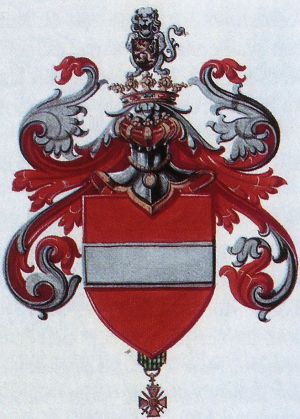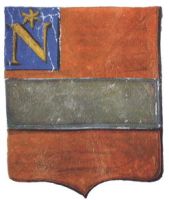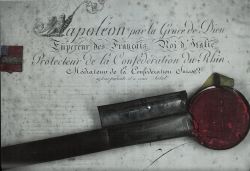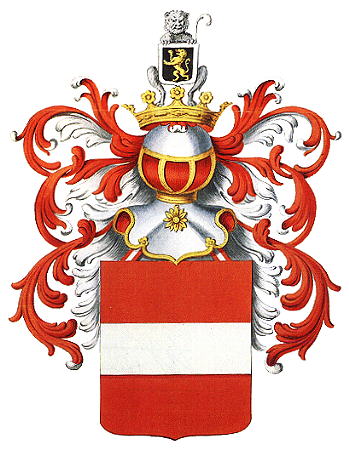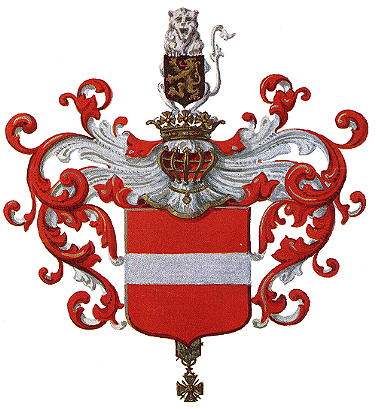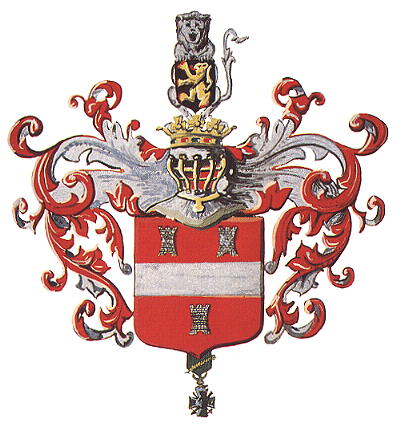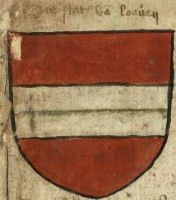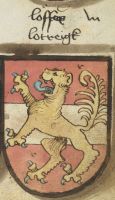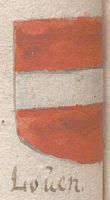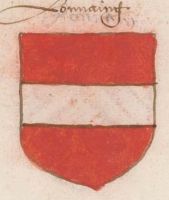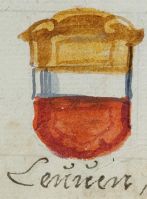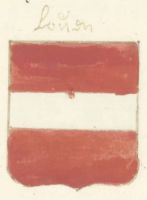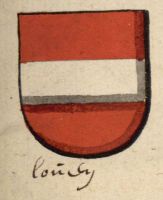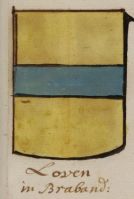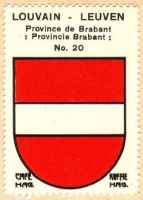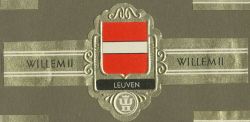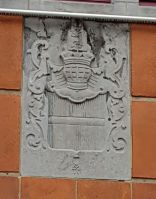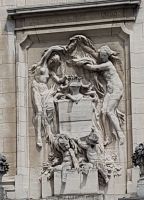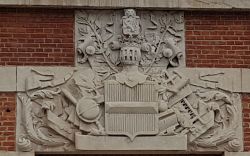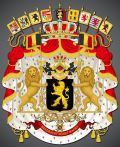Leuven: Difference between revisions
Knorrepoes (talk | contribs) m (Text replacement - " Lorraine" to " Lorraine") |
Knorrepoes (talk | contribs) No edit summary |
||
| (18 intermediate revisions by the same user not shown) | |||
| Line 1: | Line 1: | ||
{{ | {| class="wikitable" | ||
''' | |- style="vertical-align:top;" | ||
|[[File:leuven1997.jpg|center|300 px|alt=Wapen van {{PAGENAME}}/Arms (crest) of {{PAGENAME}}]] | |||
| | |||
<center>''' {{uc:{{PAGENAME}}}} '''</center><br> | |||
'''Country''' : Belgium [[File:Belgium.jpg|60 px|right]]<br><br><br> | |||
'''Province''' : <br>[[Vlaams-Brabant]][[File:vlaamsbrabant.jpg|60 px|right]]<br><br><br> | |||
'''Additions:''' | |||
* 1977 [[Heverlee]] | |||
* 1977 [[Kessel-Lo]] | |||
* 1977 [[Wilsele]] | |||
{{#display_map:50.8774,4.7044|width=250|height=250|zoom=7}} | |||
|} | |||
= | {| class="wikitable" | ||
|+Official blazon | |||
|- | |||
|'''Dutch''' | |||
| | |||
*(1926) In keel een dwarsbalk van zilver. Het schild getopt met een aanzienden helm van zilver, gekroond, getralied, gehalsband en omboord van goud, gevoerd en vastgehecht van keel; met dekkleeden van keel en zilver. helmteeken: een gezeten leeuw van zilver houdend een wapenschild met de wapens van Brabant hetgeen is: in zilver een leeuw van goud genageld en getongd van keel. het schild uiterlijk versierd met het juweel van het Fransch Oorlogskruis vergezeld van zijn lint en van den schildvoet uitgaande. | *(1926) In keel een dwarsbalk van zilver. Het schild getopt met een aanzienden helm van zilver, gekroond, getralied, gehalsband en omboord van goud, gevoerd en vastgehecht van keel; met dekkleeden van keel en zilver. helmteeken: een gezeten leeuw van zilver houdend een wapenschild met de wapens van Brabant hetgeen is: in zilver een leeuw van goud genageld en getongd van keel. het schild uiterlijk versierd met het juweel van het Fransch Oorlogskruis vergezeld van zijn lint en van den schildvoet uitgaande. | ||
*(1979) In keel een dwarsbalk, vergezeld van drie torens, alles van zilver. het schild getopt met een aanziende helm van zilver, gekroond, getralied, gehalsband en omboord van goud, gevoerd en gehecht van keel. Dekkleden keel en zilver. Helmteken: een zittende en aanziende leeuw van zilver, houdende het wapenschild van Brabant,te weten: in sabel een leeuw van goud, geklauwd en getongd van keel. Het schild van onder versierd met het Frans oorlogskruis, het lint uitgaande van de schildvoet. | *(1979) In keel een dwarsbalk, vergezeld van drie torens, alles van zilver. het schild getopt met een aanziende helm van zilver, gekroond, getralied, gehalsband en omboord van goud, gevoerd en gehecht van keel. Dekkleden keel en zilver. Helmteken: een zittende en aanziende leeuw van zilver, houdende het wapenschild van Brabant,te weten: in sabel een leeuw van goud, geklauwd en getongd van keel. Het schild van onder versierd met het Frans oorlogskruis, het lint uitgaande van de schildvoet. | ||
*(1997) In keel een dwarsbalk van zilver. Het schild getopt met een aanziende helm van zilver, getralied, gehalsband, omboord en gekroond met een stedekroon met vier torens van goud, gevoerd en gehecht van keel, met dekkleden van zilver en van keel. Helmteken: een zittende [aanziende] leeuw van zilver, houdend een schild van sabel, beladen met een leeuw van goud, geklauwd en getongd van keel. Het schild getooid met het Franse oorlogskruis met palm, het lint uitgaande van de schildvoet. | *(1997) In keel een dwarsbalk van zilver. Het schild getopt met een aanziende helm van zilver, getralied, gehalsband, omboord en gekroond met een stedekroon met vier torens van goud, gevoerd en gehecht van keel, met dekkleden van zilver en van keel. Helmteken: een zittende [aanziende] leeuw van zilver, houdend een schild van sabel, beladen met een leeuw van goud, geklauwd en getongd van keel. Het schild getooid met het Franse oorlogskruis met palm, het lint uitgaande van de schildvoet. | ||
|- | |||
|'''French''' | |||
| | |||
*(1813) De gueules à la fasce d'argent; franc quartier des villes de seconde classe, qui est à dextre d'azur à un N d'or surmonté dúne étoile rayonnante du même. | |||
*(1845) De gueules, à la fasce d'argent, timbrées d'un heaume de l'assiette taré de front, garni de gueules, grillé, liseré et couronné d'or. Cimier: un lion d'argent, assis au milieu de la couronne et tenant l'écusson de Brabant. Lambrequins de gueules & d'argent. | |||
|- | |||
|'''English''' | |||
| blazon wanted | |||
|} | |||
===Origin/meaning=== | ===Origin/meaning=== | ||
| Line 20: | Line 38: | ||
In the 17<sup>th</sup> century the city also used a crown above the shield, the size and shape of the crown have changed regularly during the centuries. <br/> | In the 17<sup>th</sup> century the city also used a crown above the shield, the size and shape of the crown have changed regularly during the centuries. <br/> | ||
In 1810 the local council | In 1810 the local council applied for the the old arms again formally to the French 'Conseil du Sceau' in Paris (Leuven was now part of the French Empire), because 'even cities like [[Diest]] applied for arms', so a major city like Leuven also needed an official grant. Leuven expected to receive arms and status as city of the first rank, equivalent to Brussels and Amsterdam. However when the grant of arms was received on February 25, 1813 the city was not pleased. Not only was the historical crown was not granted, but the arms were augmented with a free quarter with a crowned N. This was the symbol used by cities of the ''second'' rank within the French Empire. In addition, the city was entitled to use the other augmentations corresponding to cities of the second class; a helmet, with with as a crest a mural crown from which rose a staff of Mercury flanked by an olive and oak branch. The city council was not pleased with this 'degradation' and the arms thus were never used and the grant was placed in the city archive. The result is that nowadays the grand and the sealed metal tube in which it was send, are still in very good condition. | ||
<gallery widths=250px heights=200px perrow=0> | |||
File:leuven4.jpg|alt=Wapen van Leuven/Arms (crest) of Leuven|The (not appreciated) arms from 1813 | |||
| | File:leuven1813.jpg|alt=Wapen van Leuven/Arms (crest) of Leuven|The grant and sealed metal tube (image from the city archives) | ||
</gallery> | |||
After the fall of the French Empire the city remained the use of the old shield, but never applied for the official use at the Dutch government. Similarly, after the Belgian independence of 1830 the city did not apply for new arms. Finally on April 29, 1845 the city was granted official arms again. These showed the historical arms, but now with a helmet and as a crest a lion holding the arms of the Dukes of Brabant (identical to the National arms). The Dukes of Brabant descended from the Counts of Leuven. | After the fall of the French Empire the city remained the use of the old shield, but never applied for the official use at the Dutch government. Similarly, after the Belgian independence of 1830 the city did not apply for new arms. Finally on April 29, 1845 the city was granted official arms again. These showed the historical arms, but now with a helmet and as a crest a lion holding the arms of the Dukes of Brabant (identical to the National arms). The Dukes of Brabant descended from the Counts of Leuven. | ||
{|align="center" | {|align="center" | ||
|align="center"|[[File:leuven3.jpg|center]] <br/>The arms from 1845 | |align="center"|[[File:leuven3.jpg|center|Wapen van Leuven]] <br/>The arms from 1845 | ||
|} | |} | ||
In 1924 the city was mentioned in the list of martyred cities of the French army, due to the suffering in the First World War, and thus was granted to use the French War Cross. The local council thus applied for new arms, now with the French cross. These arms were granted on March 2, 1926. | In 1924 the city was mentioned in the list of martyred cities of the French army, due to the suffering in the First World War, and thus was granted to use the French War Cross. The local council thus applied for new arms, now with the French cross. These arms were granted on March 2, 1926. | ||
{|align="center" | {|align="center" | ||
|align="center"|[[File:leuven2.jpg|center]] <br/>The arms from 1926 | |align="center"|[[File:leuven2.jpg|center|Wapen van Leuven]] <br/>The arms from 1926 | ||
|} | |} | ||
| Line 39: | Line 58: | ||
After the mergers in 1977, the arms were augmented on April 2, 1979 with three castles, one for each of the former municipalities. | After the mergers in 1977, the arms were augmented on April 2, 1979 with three castles, one for each of the former municipalities. | ||
{|align="center" | {|align="center" | ||
|align="center"|[[File:leuven.jpg|center]] <br/>The arms from 1979 | |align="center"|[[File:leuven.jpg|center|Wapen van Leuven]] <br/>The arms from 1979 | ||
|} | |} | ||
These arms remained in use until 1997 when the city returned to the arms from 1926, now described properly. . | These arms remained in use until 1997 when the city returned to the arms from 1926, now described properly. . | ||
===Image gallery=== | |||
| | <gallery widths=250px heights=200px perrow=0> | ||
| | File:Leuvengo.jpg|alt=Wapen van Leuven/Arms (crest) of Leuven|The arms in the Armorial Gorrevod (1460) | ||
File:Leuvenjr.jpg|alt=Wapen van Leuven/Arms (crest) of Leuven|The arms in the Armorial Jörg Rügen (1495) | |||
File:Leuvenvr.jpg|alt=Wapen van Leuven/Arms (crest) of Leuven|The arms in a 16th century manuscript | |||
| | File:Leuven1543.jpg|alt=Wapen van Leuven/Arms (crest) of Leuven|The arms in the 16th century | ||
File:Leuven16.jpg|alt=Wapen van Leuven/Arms (crest) of Leuven|The arms in a [[:Category:Windhag city arms|16th century manuscript]] | |||
The arms in the town (2019) | File:Leuven1650.jpg|alt=Wapen van Leuven/Arms (crest) of Leuven|The arms in 1650 | ||
File:Leuven17.jpg|alt=Wapen van Leuven/Arms (crest) of Leuven|The arms in a 17th century [https://bm-lille.fr/patrimoine/digital-viewer/c-16435 manuscript] | |||
File:Leuven.hes.jpg|alt=Wapen van Leuven/Arms (crest) of Leuven|The arms in the [[Wapen- en Vlaggenboek Hesman|Wapen- en Vlaggenboek]] van Gerrit Hesman (1708) | |||
File:leuven.hagbe.jpg|alt=Wapen van Leuven/Arms (crest) of Leuven|The arms in the [[Koffie Hag Belgium|Koffie Hag/Café Hag albums]] +/- 1930 | |||
| | File:Leuvenc.jpg|alt=Wapen van Leuven/Arms (crest) of Leuven|The arms on a municipal cover (1950s) | ||
File:leuven.pol.jpg|alt=Wapen van Leuven/Arms (crest) of Leuven|The arms on a police badge ([http://blog.seniorennet.be/police_politie_insignes/ source]) | |||
File:2043.wi2.jpg|alt=Wapen van Leuven/Arms (crest) of Leuven|The arms on a Dutch [[Willem II]] cigar band | |||
File:leuven6.jpg|alt=Wapen van Leuven/Arms (crest) of Leuven|The arms in the town (2019) | |||
File:leuven7.jpg|alt=Wapen van Leuven/Arms (crest) of Leuven|The arms in the town (2019) | |||
File:leuven8.jpg|alt=Wapen van Leuven/Arms (crest) of Leuven|The arms in the town (2019) | |||
</gallery> | |||
[[Civic Heraldry Literature - Belgium|'''Literature''']]: Servais, 1955; Het wapen van de stad Leuven, no year (1980 ?); information from the city archives (on the 1813 arms) | |||
{{be}} | |||
{{media}} | {{media}} | ||
[[Category:Belgian Municipal Arms L]] | [[Category:Belgian Municipal Arms L]] | ||
Latest revision as of 07:41, 22 February 2024
|
Country : Belgium Province : Vlaams-Brabant Additions: |
| Dutch |
|
| French |
|
| English | blazon wanted |
Origin/meaning
The oldest use of the silver bar as arms of Leuven dates from a seal from 1621. The small shield can be seen between two towers of a fortified city. The arms are identical to the historical arms of Lorraine. In the early 12th century Count Godfried of Leuven became Duke of Lower-Lorraine and his arms were later transferred to the city.
In the middle ages the city also used a motto :"Loven boven, altijd God Loven", or something like "Leuven above all, but always praise the Lord".
In the 17th century the city also used a crown above the shield, the size and shape of the crown have changed regularly during the centuries.
In 1810 the local council applied for the the old arms again formally to the French 'Conseil du Sceau' in Paris (Leuven was now part of the French Empire), because 'even cities like Diest applied for arms', so a major city like Leuven also needed an official grant. Leuven expected to receive arms and status as city of the first rank, equivalent to Brussels and Amsterdam. However when the grant of arms was received on February 25, 1813 the city was not pleased. Not only was the historical crown was not granted, but the arms were augmented with a free quarter with a crowned N. This was the symbol used by cities of the second rank within the French Empire. In addition, the city was entitled to use the other augmentations corresponding to cities of the second class; a helmet, with with as a crest a mural crown from which rose a staff of Mercury flanked by an olive and oak branch. The city council was not pleased with this 'degradation' and the arms thus were never used and the grant was placed in the city archive. The result is that nowadays the grand and the sealed metal tube in which it was send, are still in very good condition.
After the fall of the French Empire the city remained the use of the old shield, but never applied for the official use at the Dutch government. Similarly, after the Belgian independence of 1830 the city did not apply for new arms. Finally on April 29, 1845 the city was granted official arms again. These showed the historical arms, but now with a helmet and as a crest a lion holding the arms of the Dukes of Brabant (identical to the National arms). The Dukes of Brabant descended from the Counts of Leuven.
| The arms from 1845 |
In 1924 the city was mentioned in the list of martyred cities of the French army, due to the suffering in the First World War, and thus was granted to use the French War Cross. The local council thus applied for new arms, now with the French cross. These arms were granted on March 2, 1926.
| The arms from 1926 |
As usual in Belgium at the time, the arms were described by Royal Decree in two languages, French and Dutch. However, the small shield is described in the French text correctly as gold on black, but in the Dutch text as gold on silver... As Leuven is in the Dutch speaking part of Belgium, the Dutch text should have preference, but its description was heraldically incorrect. So the arms were drawn according to the French description...
After the mergers in 1977, the arms were augmented on April 2, 1979 with three castles, one for each of the former municipalities.
| The arms from 1979 |
These arms remained in use until 1997 when the city returned to the arms from 1926, now described properly. .
Image gallery
The arms in a 16th century manuscript
The arms in a 17th century manuscript
The arms in the Wapen- en Vlaggenboek van Gerrit Hesman (1708)
The arms in the Koffie Hag/Café Hag albums +/- 1930
The arms on a police badge (source)
The arms on a Dutch Willem II cigar band
Literature: Servais, 1955; Het wapen van de stad Leuven, no year (1980 ?); information from the city archives (on the 1813 arms)
Belgium heraldry portal
This page is part of the Belgium heraldry portal |
Heraldry of the World |
|
Civic heraldry:
|
Other heraldry: |
Contact and Support
Partners:
Your logo here ?
Contact us
© since 1995, Heraldry of the World, Ralf Hartemink 
Index of the site
